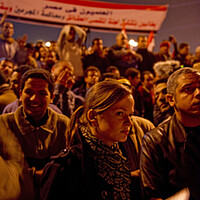Egyptian security outwits anti-coup protesters
Loading...
| Cairo
Thousands of protesters rallied in the capital and across the country today in large demonstrations against the military and in support of deposed President Mohamed Morsi, but their numbers still fell short of the massive show of strength some Islamist groups wanted.
Military and police locked down parts of the capital, blocking main roads and squares, forcing protests to stay dispersed throughout Cairo instead of gathering in one place. Thousands marched in several large protests on opposite points of the city, while smaller demonstrations gathered in some neighborhoods. Thousands also rallied in other cities across Egypt.
But after a relatively low turnout in protests last week, many were hoping for huge rallies to highlight the outrage directed at the military, which deposed Mr. Morsi last month and launched a bloody crackdown two weeks ago on his supporters and the Muslim Brotherhood, of which Morsi is a former leader. While some cities and areas saw large gatherings, the numbers in the capital were not what the Brotherhood and other Islamist groups could muster before the coup.
“The Egyptian media are deceiving people, saying we are terrorists,” says protester Heba Mahmoud in Giza, where a group of several hundred gathered, holding Morsi posters aloft and chanting energetically under the hot sun.
“The army has put tanks in the streets to stop us, and they shoot at us. We feel like it's not our country anymore, it's Sisi's country only,” she said, referring to head of the Army Gen. Abdel Fattah al-Sisi. “But still we are here. If they say the whole country supports Sisi, then let them leave the streets open.”
After the military removed Morsi from power on July 3 and installed a new interim government, his supporters gathered in two protest camps in Cairo and vowed to stay until he was reinstated. On Aug. 14 security forces cleared the camps using live ammunition, and killing hundreds. Authorities have since been arresting leaders and members of the Brotherhood in a crackdown the government casts as a “war on terrorism.” The campaign has damaged the organization's ability to communicate and mobilize supporters.
In the Mohandiseen neighborhood of the capital, thousands marched through the streets, holding aloft banners with the symbol of four raised fingers that has come to represent their movement against the military coup and crackdown. When a police helicopter hovered overhead, the crowd roared its disapproval. Young men ran ahead of the march to spray the Army chief's name on the asphalt so the marchers could stomp on it.
Many protesters said they were protesting not just for Morsi, but for a larger cause.
“I am not here to support one person. I am here to support democracy; I support freedom,” says Bassam Abdel Ghafar. Sweat poured down his face as he took a break from leading chants for female protesters, who marched separately behind the men. “I'm not from the Muslim Brotherhood, but I saw my friends killed in front of me, shot by the police,” he says.
The day was largely free of violence, though three people were reported killed in clashes outside of Cairo and police shot tear gas at one group of protesters in the late afternoon. But thousands remained on the streets as darkness fell and with it, the government-imposed curfew, raising the likelihood of clashes with police.








